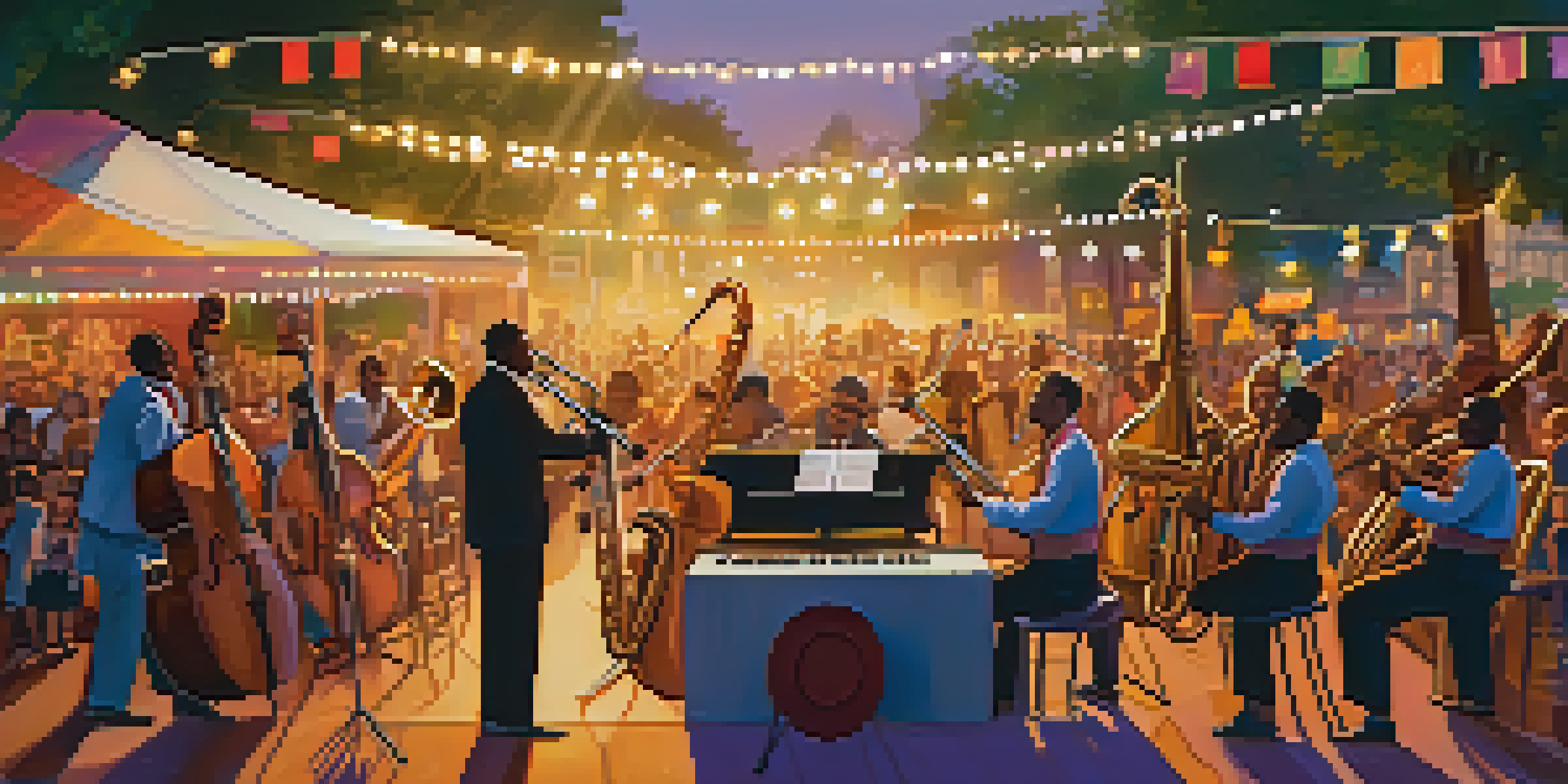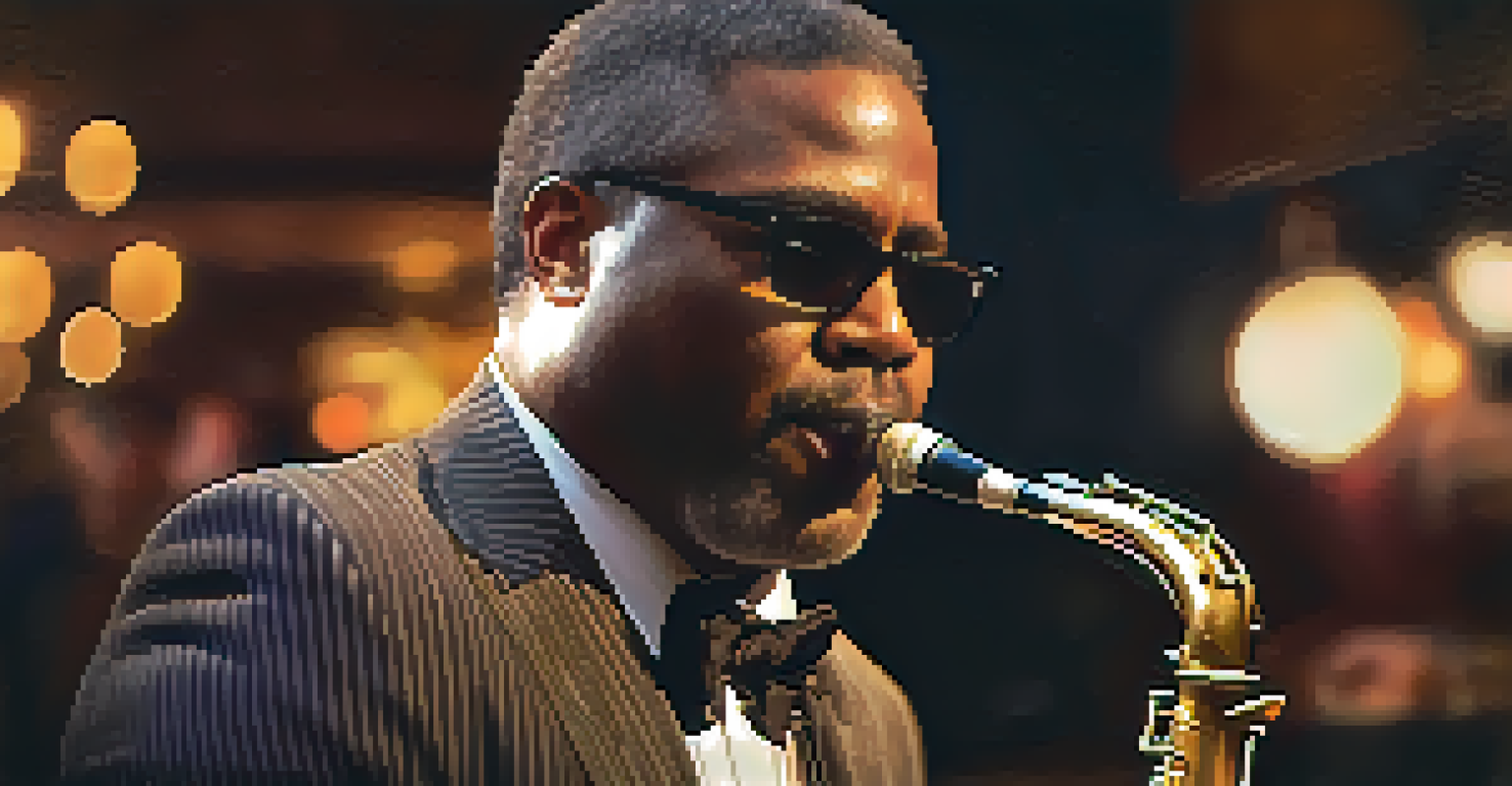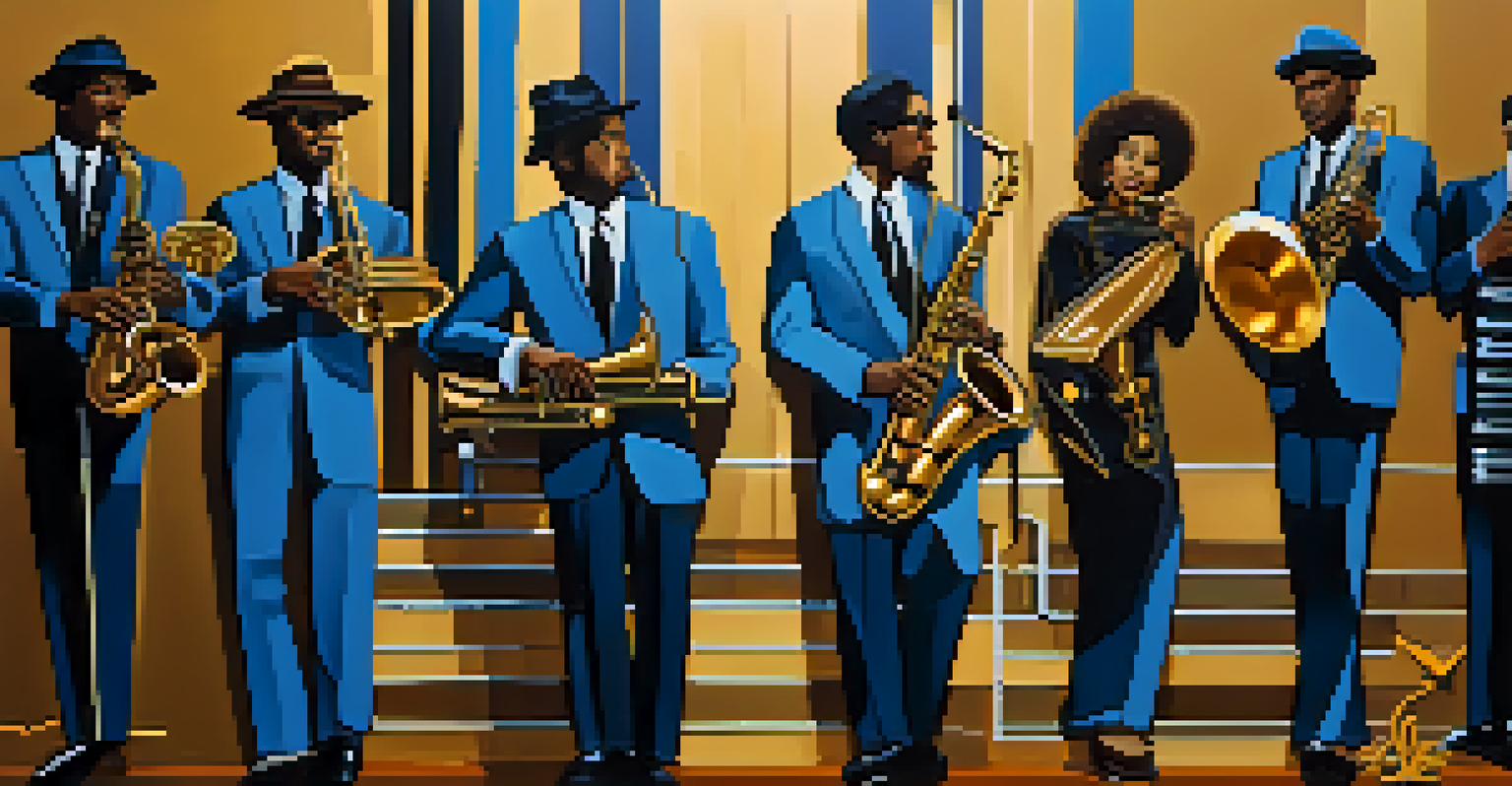Jazz as a Voice for Civil Rights: Music and Social Justice

The Roots of Jazz and Its Cultural Significance
Jazz music originated in the early 20th century, deeply rooted in African American culture. It emerged from a blend of African rhythms, blues, and ragtime, reflecting the rich tapestry of Black life in America. This genre not only provided entertainment but also served as a voice for expressing the struggles and joys of the community.
Jazz is the music of the moment. It’s a reflection of life, of love, of struggle, and of joy.
The cultural significance of jazz lies in its improvisational nature, allowing artists to express their emotions freely. This spontaneity became a metaphor for freedom itself, resonating with the civil rights movement's core message. As musicians improvised, they created not just music but a collective narrative that spoke to the aspirations of a marginalized population.
In many ways, jazz became a soundtrack for social change, influencing other genres and movements. Its ability to cross cultural boundaries opened doors for collaboration and understanding, showing how music can unite people from diverse backgrounds. The early development of jazz set the stage for its later role as a powerful tool for activism.
Jazz Icons and Their Role in the Civil Rights Movement
Iconic jazz musicians like Louis Armstrong, Billie Holiday, and Duke Ellington used their platforms to advocate for civil rights. Armstrong, known for his charismatic performances, often spoke out against racial injustice and segregation. His music and words inspired many, demonstrating how artists could wield their influence for societal change.

Billie Holiday's haunting song 'Strange Fruit' poignantly addressed the horrors of lynching in America. This powerful ballad became a protest anthem, raising awareness about racial violence and discrimination. Holiday's courage to perform such a song in a racially divided country exemplifies how jazz provided a voice for those suffering injustice.
Jazz as a Voice for Social Change
Jazz music has historically served as a powerful platform for expressing the struggles and aspirations of marginalized communities.
Duke Ellington, another jazz legend, used his music to promote racial pride and unity. He believed in the power of art to transcend barriers, and his compositions often celebrated African American culture. By showcasing the beauty and complexity of Black life, Ellington helped redefine the narrative surrounding race in America.
Jazz Festivals: A Platform for Social Change
Jazz festivals have historically served as platforms for social change, bringing together diverse audiences to celebrate music and culture. Events like the Monterey Jazz Festival and the Newport Jazz Festival have featured artists who advocate for civil rights. These gatherings not only promote jazz but also encourage dialogue about important social issues.
The only way to make sense out of change is to plunge into it, move with it, and join the dance.
By showcasing performances focused on civil rights themes, festivals create a space for reflection and discussion. They highlight the contributions of Black musicians while addressing ongoing struggles for equality. This blend of entertainment and activism demonstrates the powerful role that music can play in social movements.
Moreover, these festivals often incorporate educational programs aimed at raising awareness about social justice. Workshops and panels featuring artists and activists foster a community of passionate individuals committed to creating change. In this way, jazz festivals become more than just musical events; they transform into vibrant hubs for advocacy.
The Influence of Jazz on Other Music Genres
Jazz has not only influenced its own genre but has also left a mark on various other styles of music, including rock, hip-hop, and R&B. This cross-pollination has allowed for the dissemination of civil rights messages across different platforms. Musicians from these genres often draw inspiration from jazz's improvisational techniques and emotional depth.
For instance, artists like Nina Simone and Aretha Franklin incorporated jazz elements into their music to address social issues. Their powerful vocals and poignant lyrics echoed the sentiments of the civil rights movement, making their songs anthems for change. This blending of styles illustrates how jazz serves as a foundation for broader social commentary in music.
Cultural Unity Through Jazz
The genre's ability to transcend cultural boundaries fosters understanding and solidarity among diverse audiences.
Moreover, contemporary artists continue to explore themes of social justice through jazz-infused sounds. Musicians like Kamasi Washington are redefining jazz while confronting issues such as racism and inequality. This evolution of jazz demonstrates its enduring relevance as a voice for civil rights and social justice.
The Legacy of Jazz in Modern Activism
The legacy of jazz as a voice for civil rights continues to resonate in modern activism. Today, many artists use their music to address pressing social issues, echoing the sentiments of their predecessors. This ongoing tradition emphasizes the vital role of art in advocating for change and promoting awareness.
Events like the Black Lives Matter movement have seen musicians turn to jazz to express their solidarity and support. Artists have released songs that pay homage to the struggles faced by marginalized communities, reminding listeners of the power of music in fostering unity. The influence of jazz as a medium for social justice remains undeniable.
Additionally, educational initiatives that focus on jazz history highlight its connection to civil rights. By teaching young musicians about this rich heritage, we ensure that the spirit of activism through music continues. The legacy of jazz as a voice for social justice is not only preserved but also revitalized for future generations.
Jazz as a Unifying Force Across Cultures
One of the remarkable aspects of jazz is its ability to unite people from diverse backgrounds. The genre has traveled across the globe, influencing and being influenced by various cultures. This cross-cultural exchange has enriched jazz, making it a universal language of expression and connection.
In many countries, local musicians have embraced jazz as a means to address their own social issues. Whether it’s in South Africa during apartheid or in Brazil amidst economic struggles, artists have used jazz to voice their experiences. This adaptability highlights how jazz transcends geographic and cultural boundaries, resonating with anyone who has faced adversity.
Future of Jazz in Activism
New generations of musicians are continuing to infuse jazz with themes of equality and social justice, ensuring its relevance today.
As a result, jazz has become a symbol of hope and resilience worldwide. Festivals and collaborations featuring international jazz artists showcase the genre's ability to foster understanding and solidarity. By celebrating diversity through music, jazz continues to serve as a unifying force in the ongoing struggle for social justice.
The Future of Jazz in Social Justice Movements
As we look to the future, the role of jazz in social justice movements remains critical. New generations of musicians are infusing their work with themes of equality and activism, ensuring that jazz stays relevant in today’s socio-political landscape. This evolution is essential for keeping the spirit of jazz alive and impactful.
Moreover, the rise of digital platforms allows artists to reach wider audiences, spreading messages of social justice far beyond traditional venues. Online performances and collaborations enable musicians to connect with fans and advocate for change in innovative ways. This adaptability ensures that jazz continues to serve as a powerful tool for activism.

Ultimately, the future of jazz as a voice for civil rights will depend on the passion and commitment of its artists. By drawing from the genre’s rich history while addressing contemporary issues, musicians can inspire new conversations about justice and equality. Jazz will undoubtedly remain a vital part of the ongoing fight for social justice.